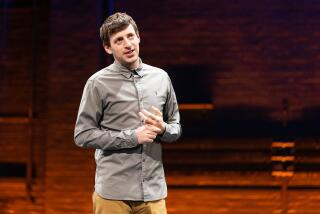A Visit Changed His Life After Years of Persecuting Others
- Share via
Even a long-sleeved turtleneck can’t cover all the tattoos on Tom Leyden’s body. A skull and blue flame on his neck and crossed hammers on his hands can’t be hidden, and serve as constant reminders of his years spent persecuting anyone who was different.
Leyden, 30, has since renounced his life as a skinhead and works as a lecturer for the Simon Wiesenthal Center. More than 50 people showed up at Holy Trinity Lutheran Church in Thousand Oaks on Sunday to hear him recount his years as a neo-Nazi.
Leyden grew up in Fontana. His parents divorced, and in his vulnerable state he fell in with skinheads.
He related horrific experiences of choosing victims at random for beatings.
“There was a time that three of us beat this gentleman up because he accidentally tripped over a girl,” he said. “We broke his jaw, knocked out four teeth, broke his ribs and I kicked in his thumb to where it went back to his wrist.”
Afterward, Leyden said, he shared beers with his friends and joked about the fight.
At 21, he enlisted in the Marines to stay out of trouble, but that didn’t quell his neo-Nazi activism.
“I had a swastika in my locker and a copy of ‘Mein Kampf’ on my bureau,” he said.
During off-duty hours, Leyden distributed neo-Nazi literature and recruited “street soldiers.” His activities even landed him on the Southern Poverty Law Center’s Klanwatch list.
In 1994, Leyden received a “less than honorable discharge” for extremist activism and excessive drinking.
He married Nicole Rodman, who also was deeply ensconced in the white supremacist movement, and they had two children.
It was then that Leyden began to have doubts about his lifestyle.
“There were a lot of things that made me think twice about it,” he told the crowd. “But what really did it was my kids.”
Leyden recalled hearing his oldest son, then 3, spout vulgar epithets, rage against the government and salute the Nazi flag.
“I thought, where’s he going to be in 15 years,” he said. “If he’s not dead or eating through a tube, then he’ll be in prison or blowing up buildings like in Oklahoma City. . . . I wanted to change that.”
In June, Leyden moved from Idaho back to California. He had no plans to repent until his mother encouraged him to visit the Simon Wiesenthal Center in Los Angeles.
“That was about the scariest thing I’ve ever done,” he said. “I thought that these people were going to hate me.”
They didn’t.
Leyden spent the next two weeks talking to center officials about the neo-Nazi movement.
Leyden’s lecture had an obvious effect. One man, the child of Holocaust survivors, wept while others shook their heads in disbelief.
“It was very powerful, even shocking,” said 12-year-old Andreas Meyer. “I didn’t know much about them [neo-Nazis], so it surprised me.”
More to Read
Sign up for Essential California
The most important California stories and recommendations in your inbox every morning.
You may occasionally receive promotional content from the Los Angeles Times.













